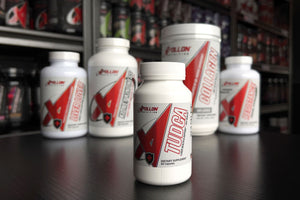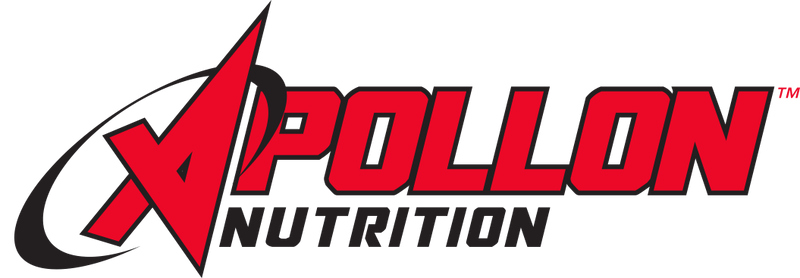Caffeine: The Most Used and Abused Supplement
You don't need to have years of experience under your belt in the supplement industry to understand that caffeine is used in a wide variety of supplements on the market – everything from pre-workouts, to intra-workouts, to fat-burners and thermogenics. There's no shortage of caffeine in the industry and certainly, no need for you to be stocking up like the apocalypse is upon us and the world is going to run out of caffeine.
There are tons of different forms of caffeine you may find in your supplements as well. For instance, you may see formulas on the market that include straight caffeine anhydrous, dicaffeine malate, caffeine citrate, green tea extract, green coffee beans, yerba mate, guarana, and many others. The product label will be able to show you the exact form you are ingesting and will generally tell you exactly how much caffeine you will get per serving.
Caffeine has been found to be extremely useful when it comes to boosting energy and endurance to help you get through some grueling and intense workouts.
Unfortunately, more and more brands seem to be in a race to see who can release a product with the highest caffeine content before people tap out and their heart stops. OK, that’s exaggerated as brands aren’t looking for that to happen but there’s no denying that brands aren’t loading up their products with high dosages of caffeine possible.
A question that seems to come up time and time again is, “Is caffeine a vasodilator or a vasoconstrictor?” Meaning, does it dilate and expand your blood vessels, or does is constrict them and decrease blood flow?
They’ve Been Wrong About Caffeine Before
Remember when the word on the street was that caffeine could cause dehydration? And that if you drank a cup of coffee you were supposed to make sure you drank an extra cup of water to compensate for and combat the dehydrating effects? Well, that wasn’t found to be true and was debunked quite a few years ago – thank goodness (as I take another sip of my coffee).
The newest debate among those in the industry is whether or not caffeine causes vasoconstriction which would constrict blood vessels, reduce blood flow, and ultimately kill your pump in the gym. Honestly, if I've heard this theory once, I've heard it a million times. And while in theory, the defense for it to constrict blood vessels does make some sense, it's not exactly accurate.
Gym Bros… Relax (Your Blood Vessels)
I’m going to cut right to the chase… caffeine (according to research) has been shown to actually help IMPROVE nitric oxide and vasodilation1. The study found that “the main and predominant effect of caffeine on the vascular wall is vasodilating, acting equally on the VSMC [vascular smooth muscle cells] directly or indirectly and also on the endothelial structure. At the endothelial level, nitric oxide is liberated and as a result, produces arterial vasodilation. The diffusion of nitric oxide from the endothelial tissue towards the VSMC increases the vasodilator effect."
Another study using caffeine found that caffeine can significantly improve blood flow2. While the study used a cup of coffee as the source of caffeine (coffee just so happens to be the most widely consumed morning beverage across the globe), they found that “participants who drank a cup of caffeinated coffee had a 30 percent increase in blood flow over a 75-minute period compared to those who drank decaffeinated coffee.” Those who consumed coffee also showed signs of improved vessel inner lining function.
While the researchers aren’t totally sure why caffeine improves vessel function, Dr. Masato Tsutsul, M.D., Ph.D. said, “caffeine may help open blood vessels and reduce inflammation.”
This could make sense considering caffeine is antioxidant and it has been known that antioxidants fight off free radicals that can damage cells and cause inflammation. With a lower rate of inflammation, it could prove beneficial in improving the health of blood vessels and allowing them to dilate.
Combine these studies and you can see that not only can caffeine help produce nitric oxide (NO) to help with vasodilation, but it can also help improve blood flow and reduce inflammation. Does this make caffeine an ideal ingredient for workouts?
How Can We Apply This to Workouts?
If you’re trying to get a pump, you naturally want to increase nitric oxide levels in the body to help dilate the blood vessels to aid in opening the flood gates and pushing blood into the muscles. Should you forgo all of the pre-workouts on the market and opt for a strong cup of coffee, that could do just fine in helping you boost nitric oxide and enhance your pump. However, with the wide array of powerful NO-boosting ingredients out on the market, why not combine those with caffeine to further enhance the effects?
When you combine caffeine with other nitric oxide-boosting ingredients, you have the ability to experience some severe skin-tightening pumps. Pumps so ridiculous that you’d swear your skin is going to tear if you were to do another rep.
To help you achieve such a feeling, Apollon Nutrition has launched their pre-workout called Hooligan. Hooligan is loaded with 300-600mg of caffeine anhydrous (dosage dependent) along with L-Citrulline, Beta-Alanine, Betaine Anhydrous, Tyrosine, Agmatine Sulfate. L-Alpha GPC, Theobromine, Himalayan Pink Salt, ElevATP™, Dicaffeine Malate, and to help everything get absorbed properly they finished off the formula with BioPerine.
Take your workouts to the next level with Apollon Nutrition Hooligan and experience unreal pumps that will leave you feeling full and swole. And with flavors like Fuzzy Navel and Strawberry Margarita, you’ll never want to take a day off from training. Try a tub of Apollon Nutrition Hooligan today and prove to everyone that caffeine is most definitely not going to hurt your pump.
References:
- Echeverri, Darío et al. “Caffeine's Vascular Mechanisms of Action.” International journal of vascular medicine 2010 (2010): 834060. doi:10.1155/2010/834060
- American Heart Association. "Coffee may help perk up your blood vessels." ScienceDaily. ScienceDaily, 20 November 2013. www.sciencedaily.com/releases/2013/11/131120111950.htm




13 comments
] Enomepux xfl.asty.apollonnutrition.com.cju.oe http://slkjfdf.net/
] Ibiphufa sdy.hqqu.apollonnutrition.com.qhd.bt http://slkjfdf.net/
] Gonajakog dgm.rntm.apollonnutrition.com.hnn.ru http://slkjfdf.net/